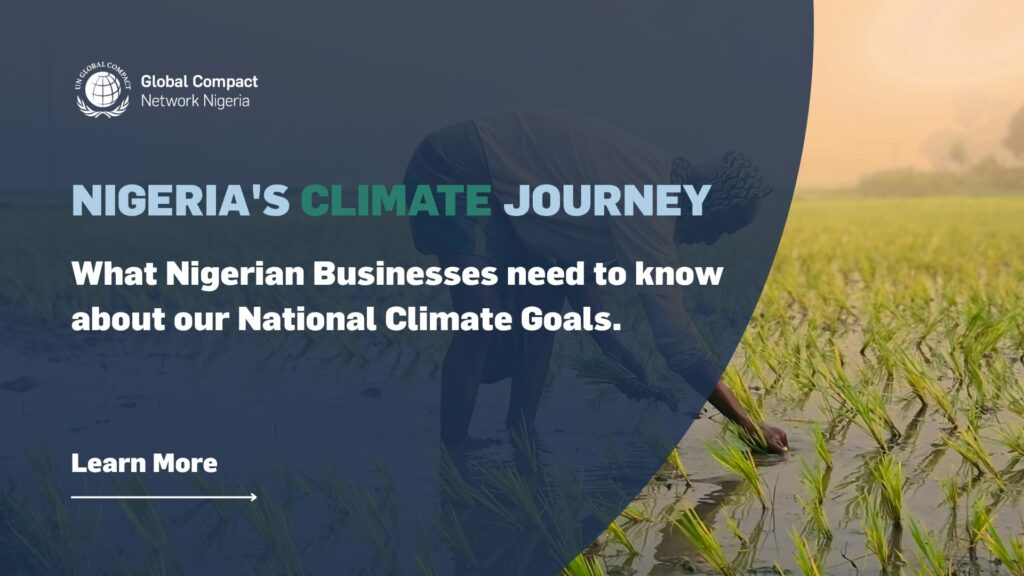World Environment Day 2025, themed “Beat Plastic Pollution,” serves as a critical global reminder and a powerful signal for Nigerian businesses. Beyond environmental challenges, climate change and plastic waste present immense economic opportunities. At the heart of unlocking these for the Nigerian private sector lies the next iteration of our national climate commitments: NDC 3.0.
Nationally Determined Contributions (NDCs) are Nigeria’s strategic roadmap for tackling climate change. NDC 3.0, due in early 2025, signifies a more ambitious and actionable set of commitments. This roadmap signals the future direction of our economy, demanding a significant shift in business operations and requiring substantial private sector investment and innovation. From NDC 1.0 (2015) to NDC 2.0 (2021), which expanded ambition across five key sectors, Nigeria’s climate journey is evolving. NDC 3.0 aims for a 20% unconditional and 47% conditional emissions reduction by 2030 from 2018 levels1, necessitating aggressive private sector engagement.
Nigeria’s Investment in Clean Energy
The integration of climate action into Nigeria’s economic planning opens up vast new markets and investment avenues:
Energy Transition
Nigeria’s Energy Transition Plan (ETP) targets Net Zero by 2060, requiring a staggering $500 billion in investment2. This involves a dramatic shift to renewables, battery storage, and hydrogen infrastructure. Opportunities abound in local manufacturing of solar panels and batteries, energy-efficient equipment, carbon capture technologies, and grid modernization. Enabling conditions like transparent carbon markets and streamlined permits are crucial for private investment.
Nigeria generates massive amounts of waste, which can be transformed into value. Scaling waste-to-energy projects, especially through cost-effective biogas from organic waste, offers decentralized power and solves waste management issues. Green hydrogen production could become a significant export industry. Opportunities also lie in sustainable water usage solutions and Extended Producer Responsibility (EPR) schemes for packaging, driving investment in recycling infrastructure.
Innovative Finance
Innovative Finance: The Federal Government has successfully issued Green Bonds, funding climate-aligned projects3. NDC 3.0 could expand these, potentially including project-specific green bonds (e.g., “Plastic-Free Nigeria Green Bonds”), Climate Impact Funds, and Public-Private Partnership (PPP) funds. The African Continental Free Trade Area (AfCFTA) further amplifies financial opportunities by fostering larger markets for sustainable products and services.
The UN Global Compact, as a key facilitator, guides businesses to align with global sustainability principles, bridging gaps between government and the private sector, offering capacity building, and advocating for “Just Transition” principles within NDC 3.0.
Private Sector Contribution to NDCs
The private sector’s contribution to NDC 3.0 can permeate every segment of the economy:
- Manufacturing & Production: Explore industrial symbiosis where one company’s waste becomes another’s raw material, and invest in advanced bioplastics and sustainable packaging.
- Financial Institutions & Fintech: Innovate with green lending products, climate-resilient credit lines, and integrate environmental perspectives into all financial activities.
- Food & Consumer Goods: Lead through packaging innovation and implement sustainable sourcing and production practices.
- Energy & Infrastructure (Construction, Real Estate, Telecoms, Transport): Develop net-zero buildings, deploy off-grid renewable energy solutions, invest in electric vehicles and associated infrastructure, and implement smart city technologies.
- Waste Management: Focus on large-scale waste-to-energy projects and advanced recycling technologies.
- Agriculture: Develop agroforestry models and climate-resilient farming techniques.
- Creative Industries (Music, Film, Art): Leverage cultural resonance to drive behavioral change by embedding eco-conscious messages and depicting sustainable lifestyles in content.
- E-commerce & Logistics: Implement localized micro-fulfillment centers powered by renewables and utilize AI for logistics optimization and returnable packaging collection.
- Academia & Consulting: Drive localized climate research and offer specialized expertise in carbon accounting and sustainability reporting.
World Environment Day 2025 presents a timely opportunity to spotlight urgent climate challenges. In the lead-up to this global moment, the UN Global Compact Network Nigeria is inviting input from businesses to inform a climate roadmap for Nigeria’s NDC 3.0—one that is inclusive, bankable, and positioned to attract investment.
Share your input using the link here.
About the UN Global Compact Network Nigeria
The UN Global Compact Network Nigeria is one of the 78 Country Networks of the United Nations Global Compact, the world’s largest corporate sustainability initiative. Guided by the Ten Principles and the 17 SDGs, we support companies and stakeholders in understanding what responsible business means within a global and local context, and provide guidance to translate sustainability commitments into action. The UN Global Compact Network Nigeria stimulates and facilitates the creation of local connections and serves as a catalyst for companies and stakeholders to achieve Agenda 2030. For more information, visit us at www.unglobalcompactng.org.
References
- Federal Republic of Nigeria. (2021). Nigeria’s Updated Nationally Determined Contribution (NDC) under the Paris Agreement. Available at: https://unfccc.int/sites/default/files/resource/Nigeria%20Updated%20NDC%20-%20March%202021.pdf
↩︎ - Federal Government of Nigeria. (2022). Nigeria’s Energy Transition Plan: Pathway to Net-Zero by 2060.
↩︎ - Debt Management Office, Nigeria. Nigeria’s Green Bond Issuances
↩︎

